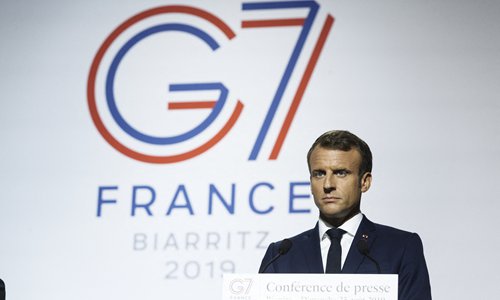HOME >> OPINION
Inequality a first among equals at G7 summit
Source:Global Times Published: 2019/8/27 18:38:40

Photo: IC
The G7 summit ended on Monday in the French resort city of Biarritz, with the fight against inequality topping the agenda. Since the international financial crisis, social inequality has become the most serious and fundamental issue facing the developed world.
The current against globalization and the rise of populism have been brought about by social inequality and wealth gap. Failure to resolve the issue will lead to social instability in Western countries.
Focusing on inequality, the G7 summit in France has tried to make some efforts in this direction. However, this was tempered by other hot-button issues and conflicts among G7 economies.
The trade dispute between China and the US has been the primary source of divergence among G7 members.
US President Donald Trump's administration has been launching trade wars on other countries and insisting on its "America First" policy, bringing uncertainty to the whole world and leading to downturns in several economies. The economies of European states, including G7 members, have been dented. Hence, the G7 summit, to some extent, has become a turf for jousting between the US and the other six. For instance, British Prime Minister Boris Johnson told Trump that "we are in favor of trade peace on the whole."
The Iran nuclear issue is also a focal point.
This issue concerns Europe's core interests - energy and security issues. Cautiously handling the affair has thus been an essential task of European countries involved in the Iran nuclear deal. Nonetheless, since the US withdrew from the pact, tensions have been running high in the Gulf region in recent months.
In a surprising initiative, French President Emmanuel Macron invited Iran's Foreign Minister Mohammad Javad Zarif to Biarritz as the G7 was ongoing. Macron had meant to ease tensions, but the move was stumped by Trump's terse "no comment" reply after the arrival of the Iranian foreign minister in the French city.
Russia is another focus of major contradictions.
Since the Ukraine crisis in 2014, Russia has been excluded from the erstwhile Group of Eight, now G7, a move of the West to isolate Russia. But after five years, European G7 members have started to realize Moscow's importance. Without Russia's support, important issues including European security, strategic stability, and Iran nuclear issue can hardly be dealt with.
But can Russia be readmitted to the group? The timing seems premature as the G7 members have failed to agree on the issue. Trump said on August 20, "I think it's much more appropriate to have Russia in." His proposal was then backed by Macron. On the other hand, leaders of Germany, UK and Canada held a different point of view.
In short, although the G7 remains an important intergovernmental economic organization, estrangement is more than apparent. With various internal contradictions and the rise of emerging powers, the global influence of G7 as a whole and all its members is declining fast.
This article is compiled by Global Times reporter Yan Yunming based on an interview with Feng Zhongping, vice president of China Institutes of Contemporary International Relations. opinion@globaltimes.com.cn
RELATED ARTICLES:
Posted in: VIEWPOINT